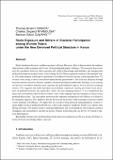Radio Exposure and Drivers of Electoral Participation among Women Voters under the New Devolved Political Structure in Kenya

View/
Publication Date
2021Author
Romanian Journal of Communication and Public Relations
Metadata
Show full item recordAbstract/
Radio dominates the news media ecosystem in Kenya. However, little is known about the relationship between radio exposure and drivers of electoral participation in Kenya. This research thus examines the correlation between radio exposure and political knowledge and attitudes, and interpersonal political discussions among women voters during the 2013 Kenya general election in Kakamega County. The study adopted a descriptive quantitative correlational research design, collecting data from 372 women voters using a survey interviewer-administered questionnaire. The data was analyzed through bivariate statistics based on Pearson’s product-moment correlation coefficients. Findings reveal a strong and positive correlation between radio exposure and political knowledge as well as election campaign interest. This suggests that radio exposure can contribute to political learning and create voter awareness on political activities and rights that lead to election campaign interest. It was established that there was a low positive link between women voters’ radio exposure and the frequency of face-to-face political discussions. The association between radio exposure and political self-efficacy was found to be strong but negative. This indicates that an increase in the level of radio exposure can lower women voters’ political self-efficacy. We argue that as a result of long political marginalization, women require higher levels of political self-efficacy, which radio exposure might not build over a shorter time during elections. This article explores various implications and recommends to policymakers, political strategists, and journalists to tap into the power of radio in boosting the key drivers of women’s electoral participation.
